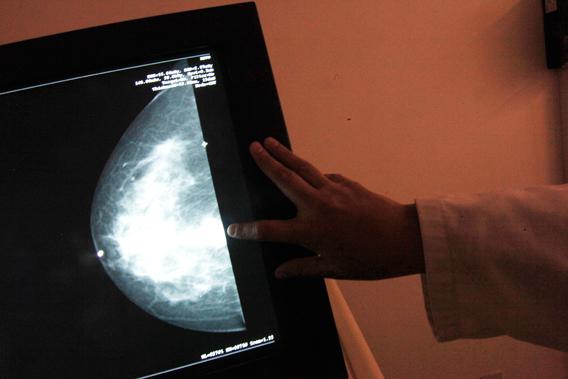Often, it takes many words—too many—to explain what’s at stake in a Supreme Court case. But on Monday, the justices will grapple with a big, seemingly straightforward question: Can a company patent a human gene?
Actually, two genes: BRCA1 and BRCA2. Women with these genes are at higher risk for breast cancer. In the mid 1990s, the geneticist who won the race to find the precise locations of the genes (on chromosomes 17 and 13), and isolate them, founded Myriad Genetics and took out 20-year patents on the genes themselves. Myriad then developed the test women take to discover whether they are BRCA carriers.
And that’s the sticking point: Myriad’s test was the only one. Doctors and scientists who wanted to develop alternatives were blocked. Patients had no choices. The company’s handling of its monopoly generated outrage. “Why were physicians and scientists so upset? It was the breadth of Myriad’s claims,” Robert Cook-Deegan, a policy researcher at Duke, explained to me. “And it really bothers women when they can’t get a second opinion, and there’s only one way to get the test, which is the way Myriad has chosen. This case is about who gets to make decisions—whether the company with the patent gets to say, ‘this is how we’re going to do testing for these genes in the United States.’ ”
The point of patents is to protect the investment it took to create or invent something new. It’s a way we reward and encourage invention. In 1793, as Yale history of science professor Daniel Kevles points out in his extremely helpful article for the New York Review of Books, Congress borrowed the words of Thomas Jefferson and declared patents available “for any new and useful art.” In 1952, the scope of potential patents expanded to “any new and useful process, machine, manufacture, or composition of matter, or any new and useful improvement.”
Does “composition of matter” include the BRCA genes—and should it? You can’t patent one of the natural elements in the periodic table. Yet the U.S. Patent Office has granted more than 3,000 patents for isolated DNA molecules, including genes like the BRCAs.
In the many briefs filed on both sides, I don’t see enough written in the voice of biotech scientists, or patients affected by gene patenting, or BRCA carriers. (There were two women in the original group of plaintiffs who needed to be tested and couldn’t get it because Myriad didn’t accept their insurance, but the special court that hears patent cases, called the Federal Circuit, dropped them from the case.) If you have direct experience related to the big questions at the heart of this case, I’d love to hear from you. What happened and what did you conclude from your experience? I’m asking for your stories and your thoughts. Please send them to me at emilybazelon@gmail.com, post them in the comments below, or tweet them at me. Email may be quoted in Slate unless you stipulate otherwise. If you want to be quoted anonymously, please let me know.
Myriad says its patents are routine. According to Myriad supporters, this patenting process is key to the development of biologic drugs that improve and save lives. Writing on the website of the World Intellectual Property Organization, consultant Esteban Burrone says that patents are “often the most crucial asset they own in a sector that is extremely research-intensive and with low imitation costs.” So if the Supreme Court takes away Myriad’s patent, the decision “will roil the biotech industry, while delighting the many critics of patents claiming human genes,” writes University of Kansas law professor Andrew Torrance.
To show that the BRCA patents aren’t blocking the progress of science, Myriad points to 8,000 papers and 130 clinical trials on the genes. The company says it doesn’t enforce the patents against educational research. Yet Kevles points out that the scientists who did this research had to work around Myriad’s restrictions. Cook-Deegan said that in the 1990s, when Myriad had even broader patents that the courts have already struck down, “it was really hard to conceive how you could even tell women her BRCA status without infringing on Myriad’s patents.” He continued, “So much of this could have been avoided if Myriad had said, first, if you want to do research, tell us, but we won’t sue you, and second if you’re having trouble getting your test paid for, we’ll make sure that happens. They say they’ve done 4,000 free tests. That’s 0.4 percent of the tests they’ve done.”
No one can invent a different version of BRCA1 or 2—the company truly has these genes, and all they represent, on lock down. Kevles’ metaphor for the effect of isolating the genes doesn’t play well for Myriad either. “The extracted raw DNA differed in material composition only trivially from the native version,” he writes. “It was no more transformed from the natural DNA than was gold upon removal from a stream bed or the yolk after separation from the rest of the egg.”
The Obama Justice Department, too, is convinced that the patents go too far. The government is arguing that isolated DNA molecules—the BRCA genes—may not be patentable. But the Justice Department says that synthetic DNA (called cDNA) can be patented, because scientists make it outside the body. It’s a rare break with the U.S. Patent Office, which declined to join DOJ’s brief for the first time in at least 30 years.
What do you think? How has gene patenting or testing affected you, and what’s your take on this case as a result? Thank you in advance for your answers.
